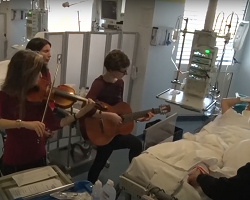Humanity, empathy and autonomy: Italian study on how to “humanize” health-care systems

The Emilia-Romagna Region of Italy, a member of the WHO European Regions for Health Network (RHN), has shared the results of an ambitious report looking at “humanization practices” in health-care settings. The Regional Agency for Health and Social Care identified projects and initiatives deployed by the regional health system that could be adapted and applied to other regions and countries sharing similar objectives.
The resulting “Catalogue of practices” could act as inspiration for health authorities aiming at meeting people’s relational needs and promoting humanity, empathy and autonomy. Beyond the creation of a database of projects and practices, a methodology for action could generate new and original humanization practices. The ambition of the report is “to make existing humanization experiences accessible to those who wish to know them and use them in their own situations”.
What is meant by the term “humanization”?
The effectiveness of the health system is, among other factors, strongly influenced by the quality of human relationships that are established between professionals and users during the treatment process. The “humanization” processes aim at creating greater autonomy, expanding the ability of users and workers to transform the reality in which they live through shared responsibility, the creation of bonds of solidarity and collective participation in health management.
The topic is considered to be part of the wider issue of health-care equity. The term “humanization” can take on multiple meanings that can be understood using the concepts of “welcome”, “hospitality”, “understanding” and “information”. It refers to a set of behaviours acquired by health-care systems to provide a service that respects people’s relational needs, their humanity and their need for empathy.
Music therapy in intensive care
One project, at Modena University Hospital in Baggiovara, Italy, involves a team of music therapy specialists, who carry out fortnightly therapy sessions for critically ill patients in the intensive care unit, using musical instruments including violins, clarinets and guitars, and voice.
Each session lasts for 2 hours, during which, in the words of one doctor, patients are helped “to find an inner state of well-being and encouraged to reconnect with the outside world, through the deep language of music. This helps them to overcome a sense of disconnection, which can result from communication difficulties”.
The project’s aim is to improve the rehabilitation phase and reduce inactivity and restlessness among patients, as well as lessen their disorientation and pain. A relative of an intensive care patient said “today, while I was in the intensive care unit, waiting for my husband to wake up, I felt something new and beautiful and my husband felt it too. I know because he became emotional and held my hand tightly”.
More than a “Catalogue of practices”
The experiences analysed in the report vary considerably in terms of target groups (children, adult couples, inmates, older people, patients affected with a variety of pathologies) types of projects (focus groups, trainings, cultural and artistic initiatives) and settings (homes, hospitals, prisons). The range of experiences includes music therapy groups for inmates, writing workshops that offer patients an opportunity to express themselves, support for couples affected by perinatal loss, training courses for doctors and midwives, and the use of meditative techniques aimed at groups of women undergoing treatment for breast cancer.
According to Maria Augusta Nicoli, Head of the “Social Innovation” programme of the Regional Agency for Health and Social Care of Emilia-Romagna, “these best practices are rooted in the organizations that implement them, and are born in a specific cultural context. The humanization practice cannot be transposed as such in other settings, but the logic behind that practice can. Humanization means recognizing the uniqueness of people, and, as a consequence, the organization involved must avoid standardization and be adaptable to the angularities encountered”.
By developing their own practices, health-care providers can leverage their own uniqueness and that of their users, by taking into consideration the social and cultural environment in which they live and operate.



